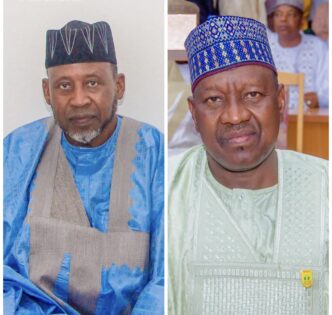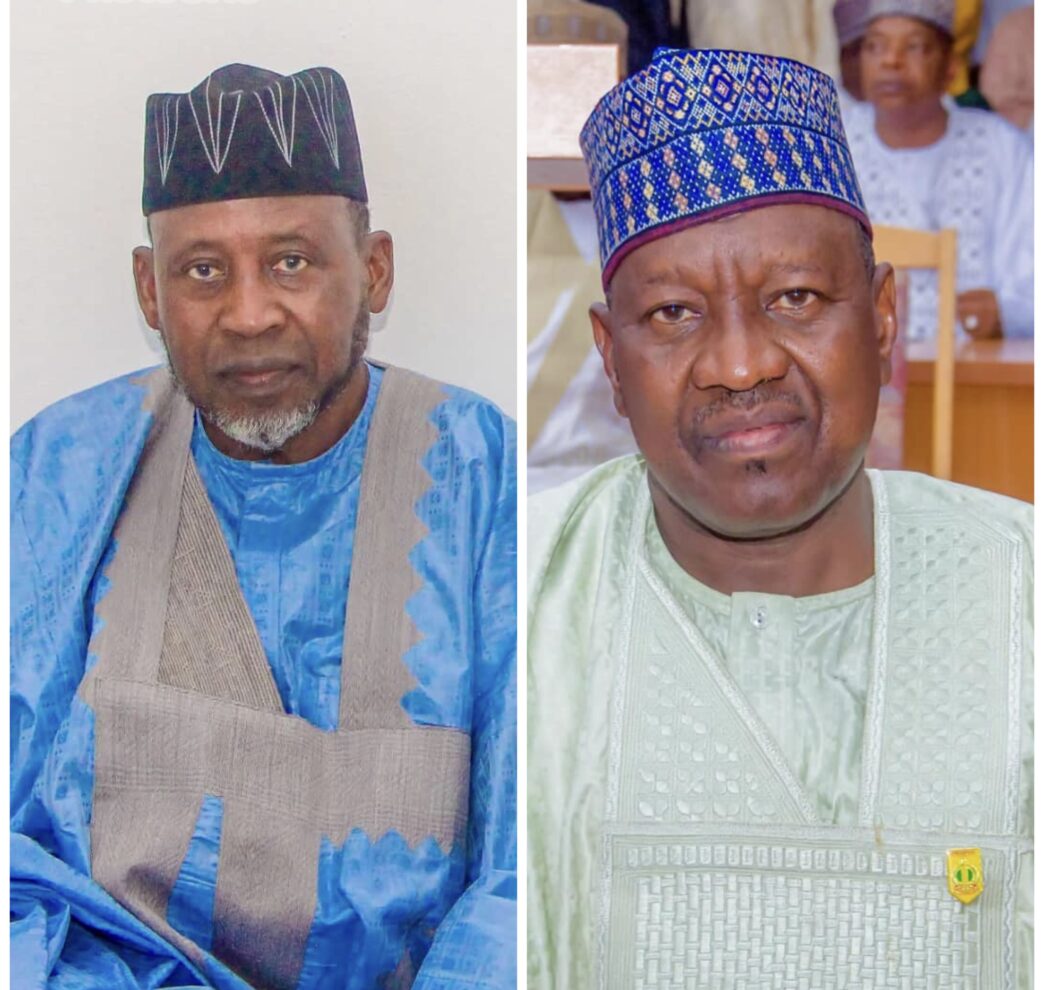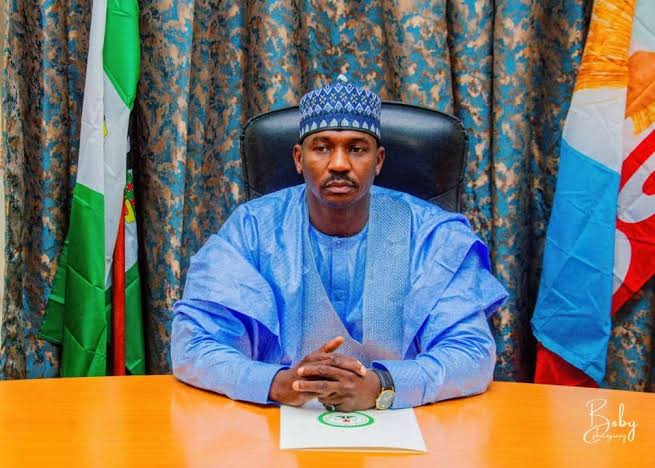“When the two men ride in the same vehicle and visit each other’s offices, it’s not mere optics; it’s governance in motion.”
Governor Ahmed Aliyu of Sokoto State is in many ways,an extremely lucky man. At a time when governance in several Nigerian states has been devastatingly slowed down by rivalry among key aides who sometimes operate as competing centres of power, Sokoto State stands out as a refreshing exception. Governor Aliyu’s administration functions with an unusual spirit of teamwork that is focused on the vigorous implementation of his 9-Point Smart Agenda. The result is an administration that functions with coherence – with Governor Aliyu as the “main power station” and the SSG and Chief of Staff as complementary sub-stations supported by a committed and dedicated team.
Governor Aliyu deserves credit for selecting capable men with both the gravitas to deliver results and the humility to remain focused on his agenda. And to also have understood from the outset that the success of his administration depends on the synergy among his senior aides and that without a cohesive team, internal politics would easily derail his goals. That’s how horrible internal politics can be.
In so many states of Nigeria, the governor’s inner circle are often a battleground of egos, with aides acting as mini-governors rather than enablers of the priorities of the administration. Rivalries between the Secretary to the State Government (SSG) and the Chief of Staff (CoS) frequently result in duplicated efforts, delays and conflicting directives. While some governors spend time managing personal conflicts, Governor Aliyu has largely been saved such distractions due to the disciplined coordination within his inner circle.
The SSG and Chief of Staff occupy two of the most strategic roles in any state government. While one manages the machinery of administration,the other coordinates the political and operational interface around the governor. When these offices clash, the result is paralysis and indecision. Sokoto State, however, offers a more functional model.
At the heart of Governor Ahmed Aliyu’s administration stability is the remarkable partnership between Alhaji Bello Sifawa, the SSG, and Alhaji Aminu Haliru Dikko, the Chief of Staff. Both men are seasoned public servants and strong political instincts. Their cooperation is rooted in mutual respect, shared purpose, and loyalty to the governor’s vision. It’s more than a good chemistry as they complement each other perfectly; while Sifawa ensures that the bureaucratic backbone functions with discipline for smooth government operations, Dikko serves as the political gatekeeper who coordinates and shields the governor from avoidable distractions.
Their strong working and personal relationship shows that they have seamlessly and effectively aligned their distinct functions to advance good governance. They have formed a quiet but influential engine room that helps ensure the governor’s agenda is executed with precision. Their maturity- placing service above ego stands out in a context where top positions are often used to advance personal ambition.
Their collaboration is deliberate, grounded in an understanding of their roles and the importance of working in perfect harmony for the best interest of their amiable principal. Their visible solidarity no doubt sends a clear message throughout the government: “We are aligned and focused on delivering the governor’s agenda.” The two are frequently seen at meetings,and driving together, which has helped create the atmosphere for constant consultation. The bureaucracy has no doubt taken note that this is a government that speaks with one voice.
The socio-economic consequences of rivalry among top government officials are often underestimated or easily dismissed, even when it is a known fact that conflicting directives do often tragically confuse public servants,stall projects, and create unnecessary disputes over priority of the administration. There is also the established fact that such rivalry mortally weakens authority and creates unproductive centres of influence. A conflict between the SSG and CoS can lead to policy inertia, duplication and mixed messaging,which will certainly erode public trust. Governor Aliyu has largely been spared such distractions and his agenda not held hostage.
Because these two key officeholders work closely, several benefits flow to the administration and the citizens. For example, it has helped in quicker decision-making, clearer communication, reduced friction, improved coordination across ministries, and ensured more effective responses to challenges. Their cooperation is not merely personal camaraderie; it is a conscious commitment to good governance and service delivery. As a result, the governor has focus and peace of mind.
Beyond organisational gains, both the SSG and the Chief of Staff bring deep administrative, political, and managerial experience. They understand how to move memoranda, coordinate across ministries, engage stakeholders, and manage internal resistance. This institutional knowledge helps the governor, himself a seasoned public servant in discharging his responsibilities. Their seamless partnership ensures that he is backed by a leadership that understands both his agenda and the pathways to its swift implementation.
Their collaboration is evident in the execution of several high-impact projects. The governor assigns significant responsibilities to the SSG and the CoS. Special committees, such as those on projects,security operations, function efficiently because of the alignment between Sifawa and Dikko.
The effect of the unity between both men has cascaded throughout the civil service. When senior leaders are aligned, ministries avoid silos and redundancies. Civil servants also model the cooperation they observe, reinforcing a culture of coordination. Crises whenever they arise are handled more efficiently, and projects across sectors- housing, health, agriculture, infrastructure- move with greater clarity and follow-up. With such a committed team behind him, it is unsurprising that Governor Aliyu is delivering visible results.
The broader lesson is that effective governance depends on the synergy between key aides. When the SSG and Chief of Staff collaborate, the system is much more disciplined and service-oriented. A governor freed from internal factionalism can concentrate on engaging federal authorities, development partners, and investors. Citizens observing the unity at the top also have confidence that with the administration functioning coherently that it will be able to deliver on its campaign promises.But where officials compete rather than collaborate, there is cynicism.
The Sokoto experience further highlights the value of interpersonal harmony in governance. While budgets, and programmes matter, but they only succeed when the leadership is aligned. The partnership between Bello Sifawa and Aminu Dikko shows that behind visible outcomes lie coordination, and shared purpose. In a country where governors face significant pressures, such an alignment is not trivial it is essential.
While the Sokoto State example may not dominate the headlines, it is quietly transformative. Unlike states where infighting overwhelms governance, Sokoto State presents an image of steady, organised leadership. It has demonstrated that unity among key officials is not cosmetic, and operationally necessary for effective policy implementation and service delivery.
Ultimately, the strength of governance is measured not by speeches, but by the ability of leaders to act in concert and drive implementation of policies for the benefit of the people. The partnership between Bello Sifawa and Aminu Dikko offers a model of efficiency and purpose, one that other states would do well to observe. In governance, as in life, unity of purpose often determines whether plans will stall or that progress will be achieved.
It is important to emphasize that the harmonious working relationship extends beyond the SSG and CoS. The same spirit of cooperation equally characterizes the administration’s engagement with the Sokoto State House of Assembly and the All Progressives Congress (APC), which has ensured steady development across all fronts. This cohesion is the hallmark of Governor Aliyu’s administration, reflecting his firm leadership and the stable political environment that he has painstakingly built. While Governor Ahmed Aliyu remains fully in control of his government, he has consistently demonstrated his respect for the wise counsel of Senator Aliyu Wamakko, his father and leader, whose guidance he acknowledges and relies on in moving Sokoto State forward.
Gatekeepers News is not liable for opinions expressed in this article, they’re strictly the writer’s.









